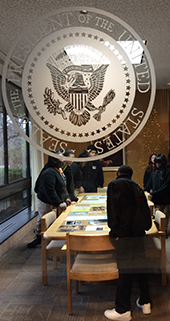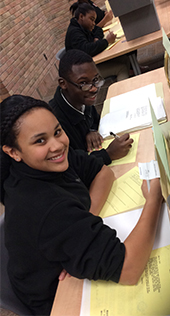Thirteen-year-olds Delmy Rivera and Raquel Santos along with their classmates at Gerald R. Ford Academic Center have spent part of their school year researching the presidency of their school’s namesake.
It’s common practice for West Michigan students who routinely study U.S. history in eighth grade to make an annual pilgrimage to the Gerald R. Ford Presidential Museum to bone up on the life of one of the region’s favorite sons. But this year, with the help of Ford Museum officials, eighth graders at the school were provided an opportunity offered few students their age to actually put their hands on rare documents archived at the Gerald R. Ford Presidential Library in Ann Arbor.
The Gerald R. Ford Presidential Library and Museum is unique among presidential museums, as Ford asked to have his library housed in Ann Arbor at the University of Michigan, his alma mater, and to have the museum in his hometown of Grand Rapids. All other presidential museums house the presidential libraries.

“It was probably a once-in-a-lifetime experience because you never know if you’re ever going to get to do it again,” Raquel said. “We knew that not all eighth-graders get to go down there and actually handle some of these documents.”
“They were pretty strict, making us wash our hands, because they don’t want the documents damaged,” echoed Delmy. “They want to keep them nice for future generations.”
A Rare Experience Indeed
Barbara McGregor, education specialist at the Gerald R. Ford Presidential Museum in Grand Rapids, said she knows of only two other groups of eighth graders who’ve been allowed to examine actual documents at the library in Ann Arbor. In preparation for the Ann Arbor trip, McGregor and her crew designed a special learning experience for the Academic Center students, visiting the school three times to teach them the basics of research. They may also be among the very few eighth-graders who know the difference between primary and secondary sources as a result.
The 21 students who made the Dec. 5 trip were required to fill out the same formal research requests as adult researchers, and once in Ann Arbor were required to take the same precautions to protect the sensitive documents as others. One student got to examine a copy of the September, 1974 speech President Ford gave pardoning President Richard M. Nixon for his part in the Watergate scandal which sparked Ford’s ascension to the presidency.

“We really drilled into them that they had to go through the same process an adult researcher would, filling out a research request and going in with clean hands, and I sense it made a pretty big impression,” McGregor said. “With Amy’s group, I tried to trip them up a bit with a couple of books and I couldn’t do it. They’re an amazing group of students.”
Keep Up the Good Work
Teacher Amy Holubeck, whose students made the trip, were required to complete reports identifying the types of documents and with what subjects they dealt. She assigned Delmy and Raquel to create a bulletin board outlining their class’s experience. She said hopes are to continue the experience for eighth graders at the school in future years.
“This is a great group of kids and I was impressed with their efforts,” Holubeck said. “They literally became experts on President Ford.”
CONNECT









